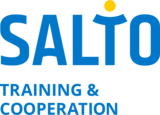Stakeholder Cooperation
The European Training Strategy in the Field of Youth encourages decision makers, experts and practitioners to continually cooperate and improve the quality of youth work as well as its recognition through capacity building. Platforms offer stakeholders on both the national and the European level exchanging existing concepts and good practices.
Sample of longlasting Platforms & Initiatives
- European Platform on Learning Mobility
This open participatory space was created for the exchange and cooperation between practitioners, researchers and policy makers. It focuses on non-formal learning with links to informal learning as well as to formal education. It is an open network in which stakeholders aim at continually improving all aspects related to learning mobility in the youth field.
A Steering Group guides the process for a certain period of time, consisting of researchers, policy makers and practitioners from a wide variety of programmes and formats in the field of learning mobility. The Steering Group is also in charge of organising a bi-annual conference, where experts from various countries across the European Union and beyond discuss current issues of youth mobility.
The next conference is planned to take place in 2017. Application details and further information can be found here.
- Annual Tool Fairs
Each year, educational practitioners who have created an educational tool and are open to share and further develop it are invited to participate in the Annual Tool Fair. The event serves as a "showroom" for the huge variety and richness of tools developed and used under Erasmus+: Youth in Action or one of its predecessors.
The Annual Tool Fair is organised by the SALTO Resource Centres in close cooperation with the respective National Agency that hosts the event. It is a place to experiment with methods and exercises used within different actions (youth exchanges, EVS, youth initiatives, trainings) and based on different themes (cultural diversity, inclusion, cooperation with partner countries, etc.). Participants can acquire know-how about the tools that currently exist, create a "common memory" and, in the meantime, promote their own tools to be used throughout the programme.
An overview of the Tool Fairs that have taken place to far can be found here.
- European Youth Work Conventions
The 1st European Youth Work Convention took place under the Belgium EU Presidency in July 2010 in Ghent, Belgium. Nine years after the European Union launched the White Paper on Youth under the previous Presidency in Belgium, the youth work and youth policy community returned to Ghent. For the first time, the focus was exclusively on youth work. The Convention sought to connect the past, present and future thinking and practice of youth work. Over 400 participants from 50 countries took part in an intensive and robust debate – through plenary sessions, ‘youth work in action’ workshops, visits to local youth projects and thematic seminars over three days. The Declaration from the 1st EYWC is addressed to the Ministers responsible for youth for the 50 countries belonging to the European Union and/or the Council of Europe, other European institutions, and political structures concerned with young people at national, regional and local government, and of course the youth work field and young people themselves.
The 2nd European Youth Work Convention took place und Belgian Chairmanship of the Council of Europe in April 2015 in Brussels, Belgium brought together 500 participants active in the youth work field to identify the common ground on which all ‘youth work’ stands and its relation to wider agendas of concern to public policy and issues facing young peopl. It gathered stakeholders from all over Europe bringing together complementary knowledge, perspectives and experiences on youth work in order to:
_Map and review the evolutions in youth work practice and policy since 2010;
_Discuss challenges facing youth work at local, national and European level;
_Find common ground within the diversity of youth work in order to foster recognition.
The Declaration of the 2nd EYWC should support the development of youth work in many aspects.
The 3rd European Youth Work Convention will take place in Bonn, Germany 7-10 December 2020.
